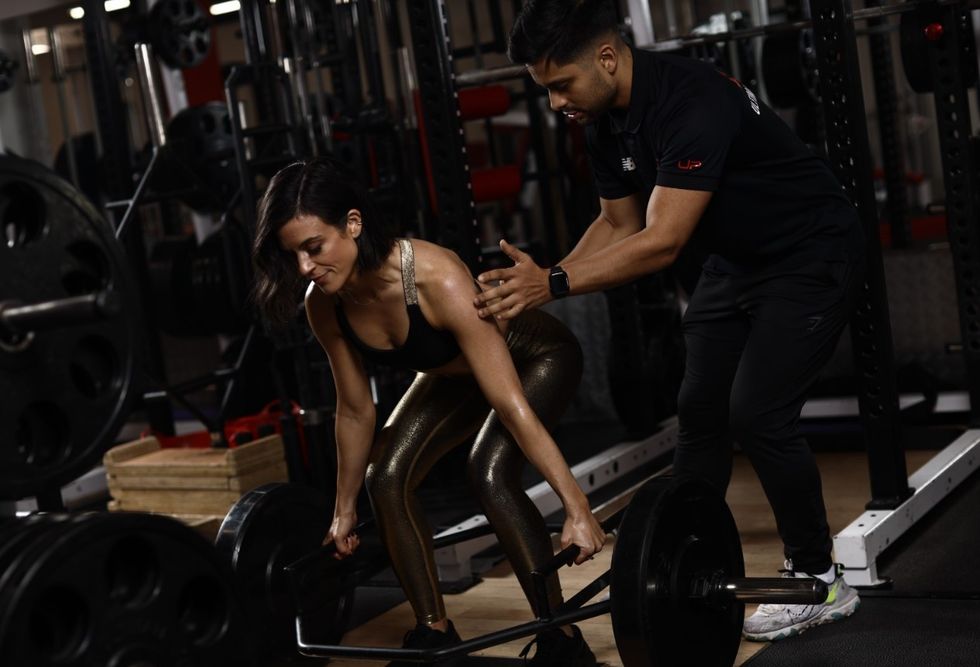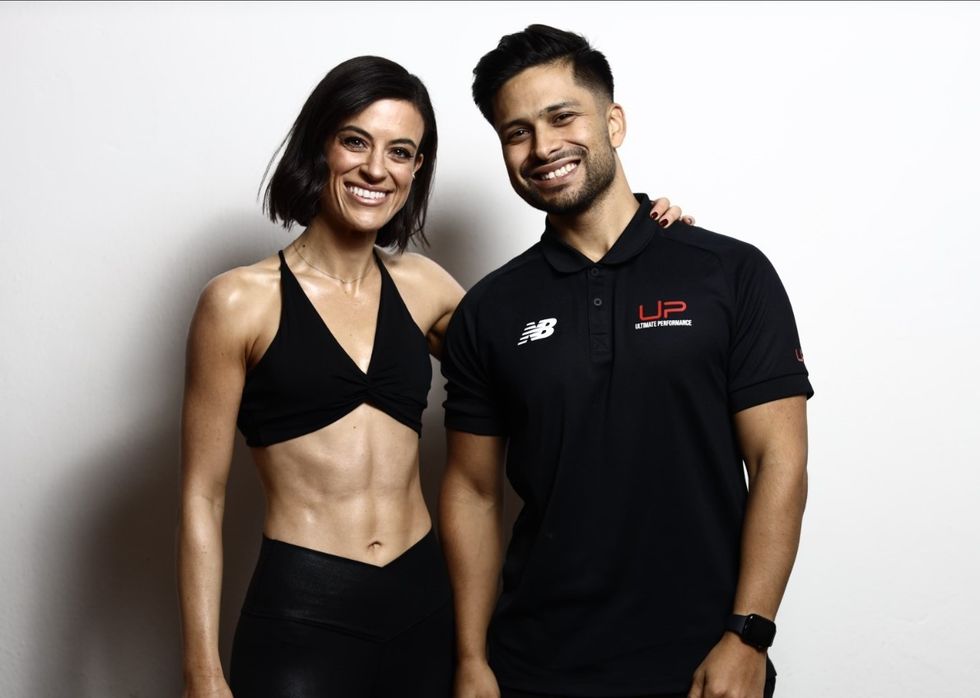GB News is showcasing the inspiring weight loss transformations of Britons and the diet regimes that helped them achieve results. A Londoner has detailed which interventions supported her stunning weight loss transformation
Don't Miss
Most Read
Trending on GB News
Losing weight can seem a gruelling challenge at times, but with countless methods available to battle the bulge, it’s about finding which works best for you.
Whilst sourcing inspirational cases of those who have prevailed to learn about the methods they used to succeed, GB News met Katarina Burnham, 35, who is living proof that shedding pounds can be an enjoyable process with the right approach.
The Londoner, who moved to the UK from Los Angeles, claimed that managing her intake of macro food groups helped massively, as did shifting the focus from the quantity to the quality of nutrients she consumed. She credited cauliflower rice and oats in particular for helping her transformation.
An amalgamation of mindfulness, healthy eating patterns and exercise offered her an approachable weight loss strategy with numerous additional health benefits.
Katarina’s weight loss journey
It was at that moment Katarina noticed the first signs of a pinched nerve that was making her fingers go numb that she decided to lose weight.
A demanding job had also led her to lose many healthy habits which had previously helped her maintain her weight.
With dedication and hard work, Katarina lost a staggering 2st 11lb (17.1 kg), dropping from 11st (69.6 kg) to 8st 3lb (52.5 kg).
Additionally, her waist girth dropped from 87cm to 66cm, coupled with a body fat reduction of 30.75 per cent to 16.5 per cent, all of which she achieved within 32 weeks.
“It has been 32 weeks, and I can’t believe what I’ve been able to achieve,” Katarina declared. “I lost 17kg, gained strength and all my random hip and back pains from working long hours at my desk have gone away.
“Previously I had been gaining weight and losing fitness steadily for a couple of years, working intense 10 to 14 hour days.
“I kept trying to get back on track by myself but without any luck and I really needed help to create a new healthy lifestyle.
“I wouldn’t have been able to do this without my amazing trainer Sergio, he gave me training nutritional education support, encouragement and accountability I needed to break through.”

Katarina shed more than two stone in 32 weeks
Katarina Burnham
Katarina's protein intake
Katarina discovered that upping her intake of proteins and fibre-rich ingredients - namely oats and cauliflower rice - was pivotal.
“Now I eat a lot more of lean meat and fish,” Katarina explained. “I’ll have more shrimp, salmon and different types of fish in my diet.
“I have chicken as well, I’ll go for the leaner beef cuts of venison. I also started eating a lot more whey protein and plant-based protein. That has been a very helpful way of increasing your protein intake throughout the day.”
Protein has long been hailed for its ability to dissipate cravings and increase the effects of exercise by maintaining muscles.
"Fish is an excellent source of high-quality protein," explained Abbas Kanani, superintendent pharmacist at Chemist Click.
"This is good for weight loss because it helps keep you feeling full for longer, controlling appetite and reducing overall calorie intake.
"Protein also has a thermic effect so the body burns more calories during digestion compared to fats and carbohydrates."
Katarina's carbohydrate intake
Many people buy into the concept that cutting out food groups like carbohydrates and fats will blast fat for good.
Laura Southern, nutritional therapist at London Gynaecology, explains that this approach isn't always the most prudent, and stresses that there is no one-size-fits-all approach to weight loss.
“When I’m supporting patients with weight loss it’s a very personalised and tailored approach that takes into account their health, metabolism, digestion and lifestyle," she said.
“I always try and advise my patients to stay away from fad diets, juice cleanses and extreme calorie restriction as these can just lead to disordered eating and yo-yo dieting.
“Plus, they don’t work. It’s estimated that 95 per cent of people who embark on a diet regain the weight and more between one to five years later.”
Cauliflower rice
Although it is common practice to eliminate carbohydrates from the diet for weight loss, swapping these for fibre-rich substitutes may be an easier win.
The most important thing to remember is that simple carbohydrates to satisfy hunger can adversely affect blood glucose levels and the body's insulin response.
“A staple now for me is cauliflower rice,” Katarina said. “So instead of eating a lot of rice, I’ll replace it with cauliflower rice.”
VJ Hamilton, a registered nutritionist and expert in autoimmune disease, confirmed that simple food swaps like this offer the quickest results for people trying to burn fat fast.
“Quick fat-burning food swaps include replacing grains with alternatives like cauliflower rice, opting for lean proteins like chicken or fish, increasing red meat and choosing healthy fats like avocadoes over processed oils," she explained.
“Incorporating more vegetables, low-calorie snacks, and staying hydrated with water also contribute to faster results in burning fat.”
Oats
Oats are another ingredient lauded for their fat-burning properties, partly for their satiating effects.
“Oats for me are now the number one thing that I’ll have almost every day,” said Katarina. “Higher in fibre, they’re filling and keep me going for longer. And you can do so many different things with oats."
Dr Carrie Ruxton, dietitian and advisor to the General Mills fibre campaign, reiterated that oats are a "very useful food for weight loss".
She said: “Firstly, oats are high in fibre, particularly the soluble type of fibre, which swells up in the gut helping to make us feel fuller for longer after meals. Secondly, oats also contain some protein which helps to dampen hunger.”
The expert quoted a 2023 review published in the Current Nutrition Reports, which found that eating oats lowers both weight and waist circumference and controls appetite.
LATEST DEVELOPMENTS

Katarina says she feels amazing in her new body
Katarina Burnham

The fitness guru committed to a consistent workout regimen
Katarina Burnham

Katarina and her personal trainer Sergio
Katarina Burnham
Katarina's exercise regimen
As with every weight loss transformation, a healthy dose of exercise generally goes hand in hand with a healthy diet.
But what now comes naturally to Katarina, such as walking 10,000 steps a day, once seemed an insurmountable challenge.
“It was hard at first,” said Katarina. “I feel like it was rehab for my body. I was going from being completely sedentary to so active."
Many of these challenges were overcome with mindfulness techniques, which Katarina claims helped her push through when things got challenging.
"If you're really feeling hopeless, you never know if you want it enough unless you're willing to ask for help," she said.
"Getting that accountability, whether from [a personal trainer] or family and friends, helps a lot too."
Joyce Patterson, MPH, registered dietitian and a diabetes care and education specialist at Michigan Medicine echoes this advice, noting that science points to a balanced approach to eating and exercise for long-term results.
“We live in a world full of messages to restrict, eliminate, and fast, and misconceptions related to diet trends are common, such as macronutrient or supplement needs," Patterson explained.
“For example, the war wages on over fats versus carbs, or eggs comes in and out of favour every couple of years, and the media and food manufacturers exploit such information to drive what people think about nutrition to increase sales.”
She continued: “While mindfulness is a key tenet in healthy eating, calories and certain food groups have been vilified by diet culture.
“Whether people are counting calories, carbs, fat, sodium and other nutrients, the interpretation is often ‘less is more’.
“Instead of focussing on healthy food choices and overall balance, some people get caught up in the minutiae of nutrients. They feel food is something to be avoided as opposed to being the fuel that provides power, strength and protection.”









